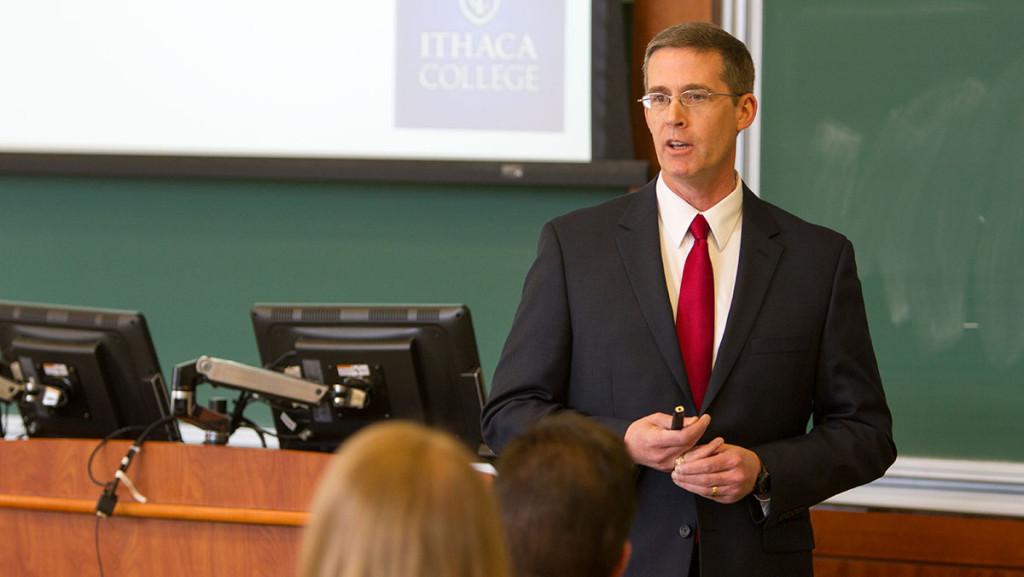Following the departure of School of Business Dean Mary Ellen Zuckerman at the end of the Spring 2014 semester, Ithaca College received the first of four potential candidates for the position March 31, where he met with staff, students and faculty to present his plans for the program.
Sean Reid, associate dean of the School of Business at Quinnipiac University, addressed many of the issues he sees in the changing nature of business education and outlined his plans to elevate the college’s performance and standards in the field.
Reid approached his presentation with a combination of formal lecturing and an informal Q&A session, engaging an audience of the college’s business community in the Dorothy D. and Roy H. Park Center for Business and Sustainable Enterprise.
Training versus Education
Reid emphasized the main problem with business schools on a national scale as being a lack of cohesion between the concepts of training and education. He pointed to a student’s ability to not only perform basic tasks but to also think on a critical level as the most vital aspect of a business education.
“Training is the skill — the practical application — but education is using your mind and thinking about the big picture,” he said. “They are both necessary, but neither one of them is a sufficient condition for having a successful business school experience.”
In addition to the issues surrounding the lack of comprehensive programs on a national scale that incorporate both training and educational aspects, Reid also pointed out and approached many of the problems specific to the college’s campus.
Challenges to Address
Reid spoke on general aspects of the college that negatively affect enrollment and the quality of the business school, including location, the rising cost of tuition and the lack of accessibility of real-world training for business students.
“The one thing that jumped out at me as being a screaming missing element was School of Business–level career development,” he said. “If I’m a parent and I’m paying what I’m paying to send my kid here, the expectation is that … they’re going to be out working and entering society.”
Reid said that as dean, he would focus on remedying this issue by encouraging the installation of more numerous and higher quality internship opportunities. Improvement of this aspect, among others, would help to better “sell” the business school to potential students and parents, he said.
Strengths to Leverage
Reid praised the college’s apparent dedication to sustainability, citing a stronger connection between the business school and environmental responsibility as key to creating a successful program.
“In your flagship program, you need to be highlighting a commitment to sustainability,” Reid said. “Companies are only investing in companies that are doing what they need to do for the environment.”
He also pointed to the Integrative Core Curriculum as being among the most useful tools in shaping the college’s business program. Having students engage with other programs on campus, he said, will help strengthen the experiences of business students.
“You have the music school that’s world renowned, you have the communications school that’s nationally renowned. There are some natural synergies I think we can make some great joint programs that would be beneficial for all schools on campus,” Reid said.








